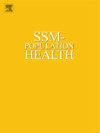The dual impact of education and occupation on cognitive functioning in older Mexican adults: A cross-sectional exploratory study
IF 3.1
2区 医学
Q1 PUBLIC, ENVIRONMENTAL & OCCUPATIONAL HEALTH
引用次数: 0
Abstract
This research investigated the relationship between cognitive performance and an individual's educational attainment as well as occupational mental demands among Mexican adults aged 50 or older. We hypothesized that cognitively demanding work boosts cognitive performance for older adults regardless of their education level. To test our hypothesis, we analyzed data on 12,939 individuals in the 2012 Mexican Health and Aging Study using a Generalized Linear Model with a Gaussian family and identity link function. We assessed cognitive demands of occupations with the National Information Network's descriptors, focusing on worker-oriented and job-oriented mental demands. We found that greater worker-oriented (β = 0.5; CI = 0.45, 0.55) and job-oriented (β = 0.49; CI = 0.45, 0.53) mental demands predicted better cognitive performance. Educational attainment correlated even more strongly with better cognitive performance (β = 0.9; CI = 0.87, 0.92). Both our models showed a statistically significant negative interaction between medium occupational mental demands and medium education level (job-oriented: β = −0.09; CI = −0.14, −0.05; worker-oriented: β = −0.07; CI = −0.12, −0.02). Other interaction terms were not significant. This study highlighted a significant effect of educational attainment on cognitive function, which is more pronounced than that of occupational mental demands. The association of higher occupational mental demands with higher cognitive function appeared to be largely independent of educational background. The similarity in cognitive scores using worker-oriented or job-oriented metrics suggests that both are useful for assessing occupational mental demands. Education and cognitive engagement at work are crucial for promoting cognitive health in aging populations.
教育和职业对墨西哥老年人认知功能的双重影响:一项横断面探索性研究。
本研究调查了墨西哥50岁以上成年人的认知表现与个人受教育程度和职业心理需求之间的关系。我们假设,无论受教育程度如何,认知要求高的工作都能提高老年人的认知表现。为了验证我们的假设,我们使用具有高斯家族和身份链接函数的广义线性模型分析了2012年墨西哥健康与老龄化研究中12,939个人的数据。运用国家信息网络描述符对职业认知需求进行了评估,重点考察了以劳动者为导向和以工作为导向的心理需求。我们发现更大的工人导向(β = 0.5;CI = 0.45, 0.55)和工作导向(β = 0.49;CI = 0.45, 0.53),心理需求预测更好的认知表现。受教育程度与更好的认知表现的相关性更强(β = 0.9;Ci = 0.87, 0.92)。两个模型均显示中等职业心理需求与中等教育水平之间存在显著的负交互作用(以工作为导向:β = -0.09;Ci = -0.14, -0.05;工人导向:β = -0.07;Ci = -0.12, -0.02)。其他相互作用项不显著。本研究发现,受教育程度对认知功能的影响显著高于职业心理需求的影响。较高的职业心理需求与较高的认知功能之间的关系在很大程度上与学历无关。以工人为导向和以工作为导向的认知得分的相似性表明,两者都有助于评估职业心理需求。工作中的教育和认知参与对于促进老年人的认知健康至关重要。
本文章由计算机程序翻译,如有差异,请以英文原文为准。
求助全文
约1分钟内获得全文
求助全文
来源期刊

Ssm-Population Health
PUBLIC, ENVIRONMENTAL & OCCUPATIONAL HEALTH-
CiteScore
6.50
自引率
2.10%
发文量
298
审稿时长
101 days
期刊介绍:
SSM - Population Health. The new online only, open access, peer reviewed journal in all areas relating Social Science research to population health. SSM - Population Health shares the same Editors-in Chief and general approach to manuscripts as its sister journal, Social Science & Medicine. The journal takes a broad approach to the field especially welcoming interdisciplinary papers from across the Social Sciences and allied areas. SSM - Population Health offers an alternative outlet for work which might not be considered, or is classed as ''out of scope'' elsewhere, and prioritizes fast peer review and publication to the benefit of authors and readers. The journal welcomes all types of paper from traditional primary research articles, replication studies, short communications, methodological studies, instrument validation, opinion pieces, literature reviews, etc. SSM - Population Health also offers the opportunity to publish special issues or sections to reflect current interest and research in topical or developing areas. The journal fully supports authors wanting to present their research in an innovative fashion though the use of multimedia formats.
 求助内容:
求助内容: 应助结果提醒方式:
应助结果提醒方式:


